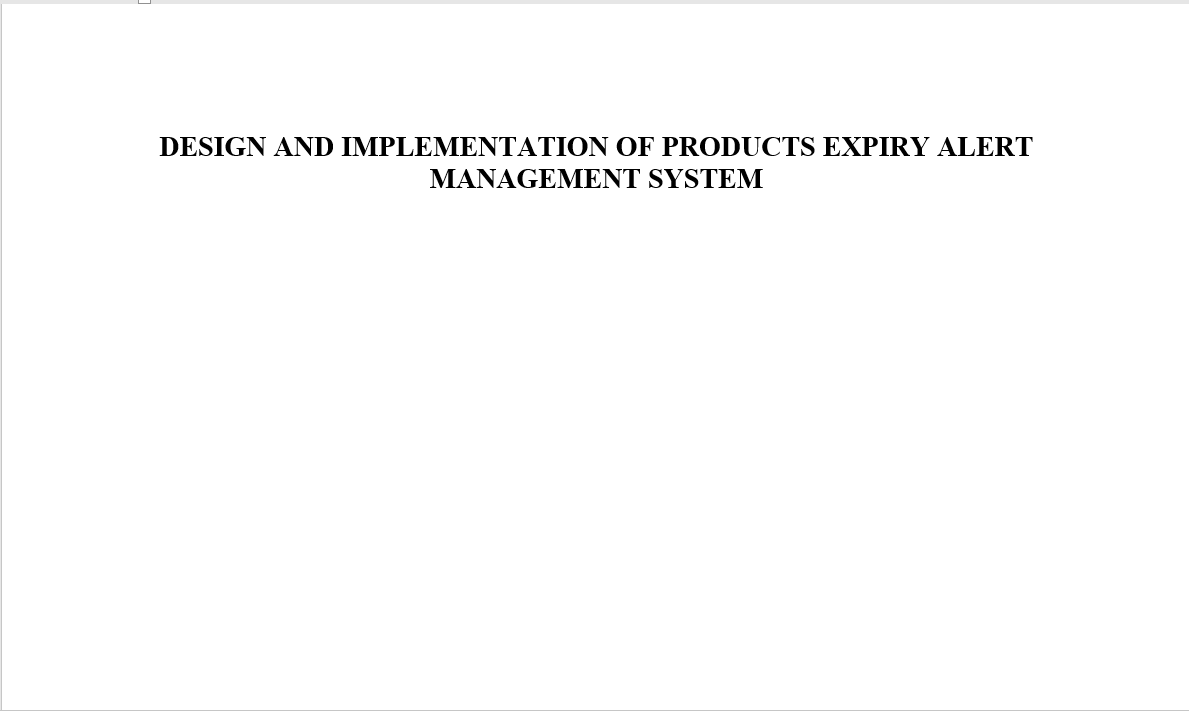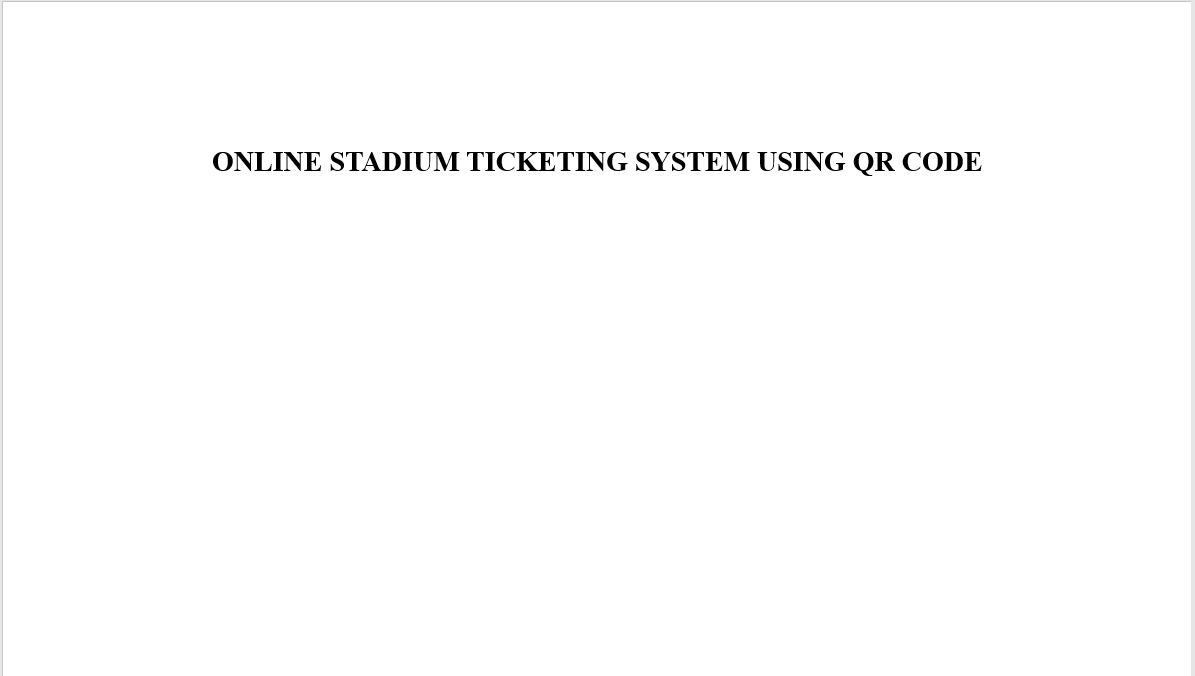Product Expiry Alert Management System for Pharmacy
₦5,000.00
Product details
This documentation has a source code View here
PRODUCT EXPIRY ALERT MANAGEMENT SYSTEM
ABSTRACT
The modern marketplace is characterized by a vast array of perishable products, ranging from food items to pharmaceuticals, each governed by distinct expiration timelines. Timely management of product expiration dates is paramount for businesses, consumers, and environmental sustainability. This thesis presents the design and implementation of a web-based product expiry alert system, a technological solution aimed at addressing the challenges associated with expiration date tracking, notification, and management. Product expiration management is a critical facet of inventory control and consumer safety. The absence of a centralized, user-friendly system has resulted in inefficiencies, excessive waste, and potentially harmful product consumption. In response to this pressing issue, this research endeavors to create an integrated web-based system to offer businesses and consumers an efficient means to monitor product expirations.
The objectives of this study encompass the development of a comprehensive system architecture that collects and stores drugs information, implements alert mechanisms to notify users about impending expirations, and offers customization options for user preferences. A thorough investigation of related literature, including product expiration management and SMS based alert systems, has informed the system's design and functionality. This research concludes that the web-based product expiry alert system contributes significantly to the domain of product expiration management, offering a practical solution to the challenges faced by industries and consumers alike. The system's testing results demonstrate its effectiveness in reducing waste and ensuring consumer safety. The developed system focused on drugs and was built using PHP for server-side programming, HTML, JavaScript for frontend and MySQL for data storage.
CHAPTER ONE
INTRODUCTION
1.1 Background of the Study
In the dynamic and diverse landscape of modern commerce, a wide range of perishable products constantly circulates through markets, supermarkets, pharmacies, and countless other industries. These products, which encompass everything from food items to pharmaceuticals, come with a fundamental characteristic - an expiration date. Timely and efficient management of product expiration dates is a critical aspect of inventory control, consumer safety, and environmental sustainability.
Product expiration management is a multifaceted challenge that businesses and consumers grapple with daily. The scope of this challenge extends across a multitude of industries, each governed by its unique set of expiration timelines and regulatory requirements. For instance, in the food industry, the preservation of product quality and safety requires strict adherence to expiration dates, as consuming expired products can lead to health risks. In the pharmaceutical industry, precise management of medication expiration dates is imperative to ensure the potency and effectiveness of drugs, directly impacting patient health.
The gravity of efficient product expiration management becomes evident when we consider the economic implications. For businesses, ineffective management can result in substantial financial losses due to waste, costly recalls, and damaged reputation. On the other hand, consumers face risks to their health and safety when exposed to expired products inadvertently. Moreover, the environmental impact is significant, as improper disposal of expired products contributes to pollution and waste problems.
Traditionally, managing product expiration dates has relied on manual methods, including date checks, spreadsheets, and handwritten records. Such methods are inherently prone to errors, are labor-intensive, and often fail to deliver timely alerts. In the era of digital transformation, there is a pressing need for an integrated and automated solution to track, notify, and manage product expirations efficiently.
The absence of a centralized, user-friendly system for product expiration management has led to inefficiencies and waste across industries. This deficiency calls for the development of a web-based product expiry alert system, which can provide businesses and consumers with a practical means to monitor product expiration dates, receive timely notifications, and mitigate the challenges associated with product expiry.
This thesis, "Design and Implementation of a Web-Based Product Expiry Alert System," seeks to address the fundamental challenges in product expiration management by proposing a technological solution that leverages the capabilities of web-based platforms. Through a comprehensive exploration of this system's design, implementation, and evaluation, we aim to contribute to more efficient, sustainable, and user-centric product expiration management practices.
The subsequent chapters of this thesis will provide detailed insights into the problem statement, objectives, scope, significance, methodology, implementation, and outcomes of the web-based product expiry alert system, offering a holistic view of the research endeavor.
1.2 Statement of the Problem
Effective management of product expiration dates is a critical issue in various industries, encompassing perishable products, such as food items, pharmaceuticals, and consumer goods. The absence of a centralized, user-friendly system for tracking and managing product expirations has given rise to several pressing challenges and concerns that warrant attention:
- Manual and Error-Prone Methods: Traditional methods for managing product expiration dates are largely manual, including date checks, spreadsheets, and handwritten records. These methods are labor-intensive and inherently error-prone, leading to inaccuracies in tracking expiration dates. This can result in expired products remaining on shelves, posing health and safety risks to consumers, and causing financial losses to businesses.
- Lack of Timely Notifications: Manual methods lack timely notification mechanisms, making it difficult for businesses and consumers to stay updated on upcoming product expirations. As a consequence, products often expire before they are identified and removed from inventory or consumption.
- Economic Implications: Inefficient product expiration management carries substantial financial implications for businesses. It results in wastage, costly recalls, and potential damage to brand reputation. For consumers, expired products can lead to health risks, hospitalization, and increased medical expenses.
- Environmental Impact: Inadequate product expiration management contributes to environmental issues. Disposal of expired products, particularly pharmaceuticals and chemicals, can lead to pollution, contamination of water sources, and adverse ecological consequences.
- Diverse Industry Needs: Different industries, such as food, pharmaceuticals, and cosmetics, have unique expiration date requirements and regulations. A one-size-fits-all solution is often inadequate to address the diverse needs of these industries effectively.
- Accessibility and User-Friendliness: Existing solutions, if any, may lack accessibility and user-friendliness, making them unsuitable for small businesses, consumers, or individuals who lack technical expertise.
In light of these challenges, there is an urgent need for an integrated, web-based product expiry alert system that addresses the diverse requirements of various industries. Such a system should offer real-time monitoring, precise notifications, and customization options for businesses and consumers. Additionally, it should serve as a sustainable solution by reducing waste and promoting environmentally responsible practices.
Therefore, this research aims to propose, design, and implement a web-based product expiry alert system that mitigates the issues associated with manual tracking and management of product expiration dates. The system's development is expected to contribute to more efficient, cost-effective, and sustainable product expiration management practices in various industries.
1.3 Aim and Objectives of the Study
The primary aim of this research is to design and implement a web-based product expiry alert system that addresses the challenges outlined in the statement of the problem. To achieve the stated aim, the following specific objectives were laid out:
- To design and develop a web-based drugs expiry alert system for a pharmacy that offers a centralized platform for tracking, managing, and notifying owners about product expiration dates.
- To implement real-time monitoring of product expiration dates, ensuring that users are promptly alerted to impending expirations.
- To provide customization options for businesses and consumers, allowing users to set preferences for notification methods and threshold dates for alerts.
- To design a user-friendly interface that caters to a wide range of users, including small businesses, consumers, and individuals with varying levels of technical expertise.
- To conduct thorough testing and validation of the system's accuracy in alerting product expirations and the effectiveness of the notification mechanisms.
1.4 Scope of the Study
The scope of this research is defined to provide clarity on the boundaries and focus of the study. The study encompasses the following aspects:
This research is primarily focused on perishable products with expiration dates. Our focus on this study are pharmaceuticals. It is vital to acknowledge that certain industries and products, such as highly specialized or industrial items, may fall outside the defined scope of this study.
The product expiry alert system is web-based and is designed to cater to various types of pharmaceuticals users, both small and large, as well as individual consumers. The scope extends to users with varying levels of technical expertise. The developed system specifically caters for the product registration which collects data like name of product, price, registration date, production date, expiration date and notification time which can either be weekly or monthly.
The system is designed to accommodate diverse regulatory requirements applicable to different industries. However, it does not aim to provide legal advice or ensure absolute compliance with all local and international regulations.
1.5 Significance of the Study
The significance of this study is rooted in its potential to address critical challenges in product expiration management, benefiting a wide range of stakeholders, and making a substantial contribution to several areas:
1.5.1 For Businesses
- Efficiency and Cost Reduction: The web-based product expiry alert system offers businesses a means to streamline their inventory management, reducing waste and associated costs. The automation of expiration date tracking and real-time notifications enhances operational efficiency and minimizes financial losses.
- Enhanced Reputation: Efficient product expiration management can bolster a company's reputation for product quality and safety. Minimizing the risk of expired products reaching consumers helps build trust and brand loyalty.
1.5.2 For Consumers
- Health and Safety: Consumer safety is paramount, and the system ensures that consumers are alerted to product expirations well in advance, reducing the likelihood of consuming unsafe or expired products.
- Informed Choices: Consumers gain access to timely information about the freshness of the products they purchase, allowing them to make informed choices and avoid potentially harmful or ineffective items.
- Financial Savings: By preventing the purchase of expired products, consumers can save money and reduce food and product waste.
1.5.3 Academic Contribution
- Research and Innovation: The study adds to the academic understanding of web-based solutions for product expiration management. It serves as a valuable resource for researchers and innovators seeking to address challenges in inventory control and consumer safety.
- Comparative Analysis: The comparative analysis with existing solutions provides insights into the performance, usability, and efficiency of web-based alert systems, offering academic and practical reference points for future research and development.
This "Significance of the Study" section emphasizes the wide-ranging impact and contributions of the research, highlighting how the web-based product expiry alert system can address critical challenges and benefit various stakeholders.
1.6 Definition of Terms
- Product Expiration Management: The systematic process of monitoring, tracking, and controlling the expiration dates of perishable products to ensure they are used or disposed of before reaching their designated expiration date.
- Web-Based Alert System: A digital system that operates over the internet and provides real-time notifications and alerts to users based on predefined criteria, typically via web applications, email, or mobile apps.
- Perishable Products: Goods that have a limited shelf life and are prone to spoilage or deterioration over time, including food items, pharmaceuticals, cosmetics, and other consumer products.
- Expiration Date: The date specified on a product by the manufacturer or regulatory authority, indicating when the product is expected to reach the end of its shelf life or effectiveness and should not be used or consumed.
- Regulatory Compliance: Adherence to local, national, and international regulations and standards governing the management and labeling of perishable products, such as food safety regulations or pharmaceutical expiration date requirements.
- Efficiency: The ability of the web-based product expiry alert system to optimize the process of monitoring and managing product expiration dates, reducing waste, time, and effort.
- Sustainability: A holistic approach to product expiration management that seeks to minimize environmental impact by reducing waste, conserving resources, and promoting responsible disposal of expired products.




0 comment(s)
Leave comment
Login or Register to leave a comment.